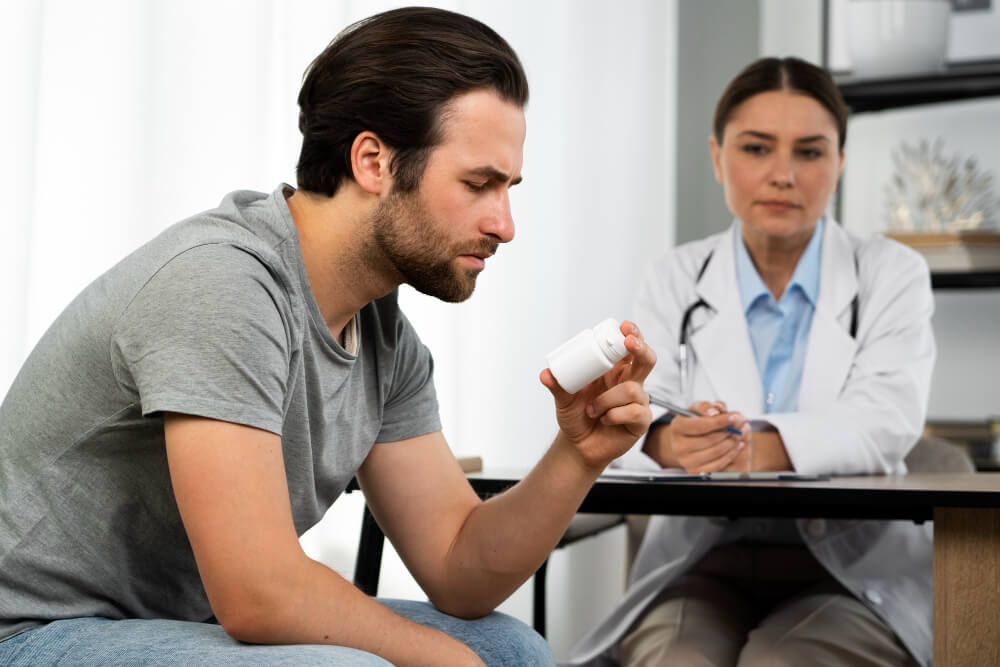Reclaiming the Mojo: Exploring TRT in Men’s Health
Imagine your body as a finely tuned orchestra, where hormones act as conductors, ensuring harmony and optimal performance. Testosterone, the maestro of masculinity, plays a crucial role in this symphony, influencing everything from muscle mass and bone density to sexual function and mood. But when the testosterone melody falters, a discordant chorus of symptoms can emerge, impacting men’s physical and emotional well-being. This article delves into the intricate world of men’s health, unveiling the causes and consequences of low testosterone, exploring Testosterone Replacement Therapy (TRT) as a potential restorative measure, and empowering men to take control of their hormonal symphony.
The Fading Melody: Recognizing the Signs of Low Testosterone
While testosterone levels naturally decline with age, a significant drop can lead to a range of uncomfortable and concerning symptoms:
- Physical Changes: Reduced muscle mass, increased body fat, and decreased bone density can be early indicators. Fatigue, low energy, and diminished strength are also common.
- Sexual Dysfunction: Erectile dysfunction, decreased libido, and reduced sperm production are significant and often distressing symptoms of low testosterone.
- Emotional Shifts: Mood swings, irritability, depression, and decreased motivation can be linked to hormonal imbalances.
Diagnosing the Discord: When to Seek Testosterone Testing
If you suspect low testosterone, a doctor will conduct a comprehensive evaluation, including:
- Medical History and Physical Examination: Assessing symptoms, lifestyle factors, and potential medical conditions that could impact testosterone levels.
- Blood Tests: Measuring total and free testosterone levels to determine if they fall below the normal range.
- Additional Tests: In some cases, further tests may be necessary to rule out underlying medical conditions.
Restoring the Symphony: Exploring Testosterone Replacement Therapy (TRT)
For men diagnosed with hypogonadism, a condition characterized by low testosterone production, TRT can be a valuable tool to restore hormonal balance and alleviate symptoms. It comes in various forms:
- Injections: The most common type, usually administered weekly or bi-weekly.
- Gels and Patches: Topical options applied to the skin daily or twice weekly.
- Oral Testosterone: Less common due to potential liver side effects.
Finding the Right Harmony: Individualized Treatment Plans
The key to successful TRT lies in a personalized approach:
- Dosage Optimization: Starting with a low dose and gradually adjusting based on individual needs and blood tests ensures optimal outcomes with minimal side effects.
- Long-Term Monitoring: Regular blood tests and doctor consultations are crucial to monitor progress, adjust dosages as needed, and identify potential side effects.
- Addressing Underlying Conditions: Treating any underlying medical conditions contributing to low testosterone is essential for long-term success.
Beyond the Needle: Lifestyle Modifications for Testosterone Boost
While TRT can work wonders, lifestyle changes can synergistically enhance its effectiveness and overall well-being:
- Healthy Diet: Prioritizing fruits, vegetables, whole grains, and lean protein, while limiting processed foods and sugary drinks, can naturally optimize testosterone levels.
- Regular Exercise: Engaging in strength training and moderate-intensity exercise stimulates testosterone production and improves overall health.
- Stress Management: Chronic stress can suppress testosterone levels. Practices like meditation, yoga, and deep breathing can help manage stress and support hormonal balance.
- Adequate Sleep: Aim for 7-8 hours of quality sleep each night, as sleep deprivation can negatively impact testosterone production.
The Unwritten Concerto: Navigating the Psychological Aspects of TRT
Deciding about TRT can be emotionally challenging. Consider:
- Addressing Expectations: Understanding that TRT is not a magic bullet and takes time to show results is crucial.
- Open Communication: Discussing concerns and expectations with your doctor and potential partners can prevent misunderstandings and anxieties.
- Counseling and Support: Seeking professional help can address any emotional concerns related to body image, masculinity, or relationships.
Conclusion:
Men’s health is often veiled in silence, but embracing open conversations about issues like low testosterone and TRT is crucial. Remember, TRT is a medical intervention that requires careful consideration and professional guidance. By understanding the causes and consequences of low testosterone, exploring treatment options, and adopting healthy lifestyle habits, men can reclaim control of their hormonal symphony and orchestrate a life filled with renewed energy, vitality, and well-being.


